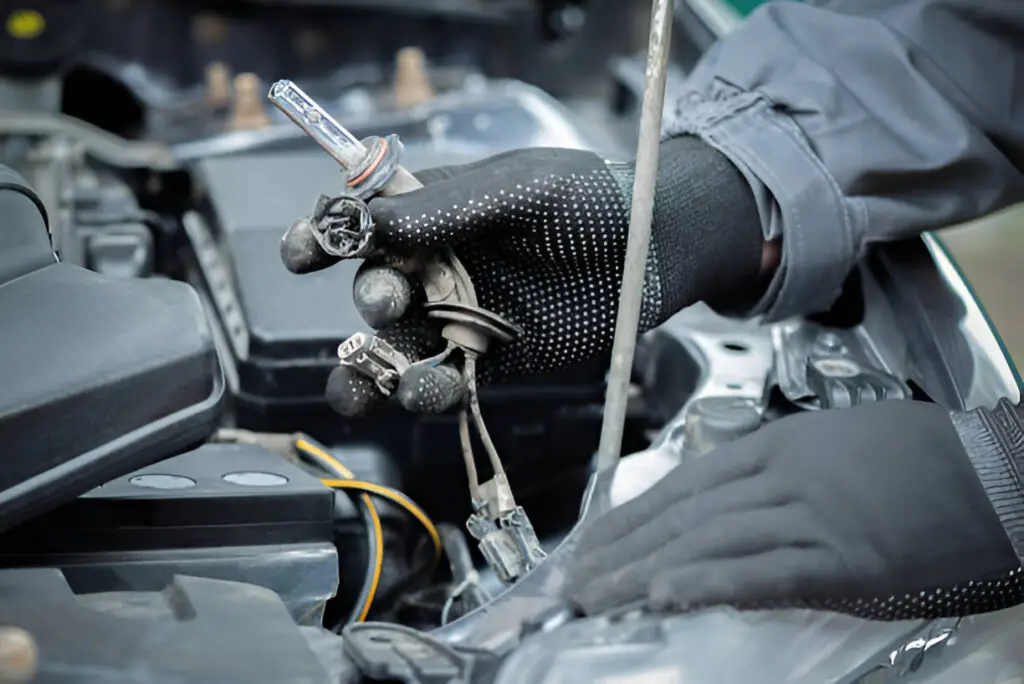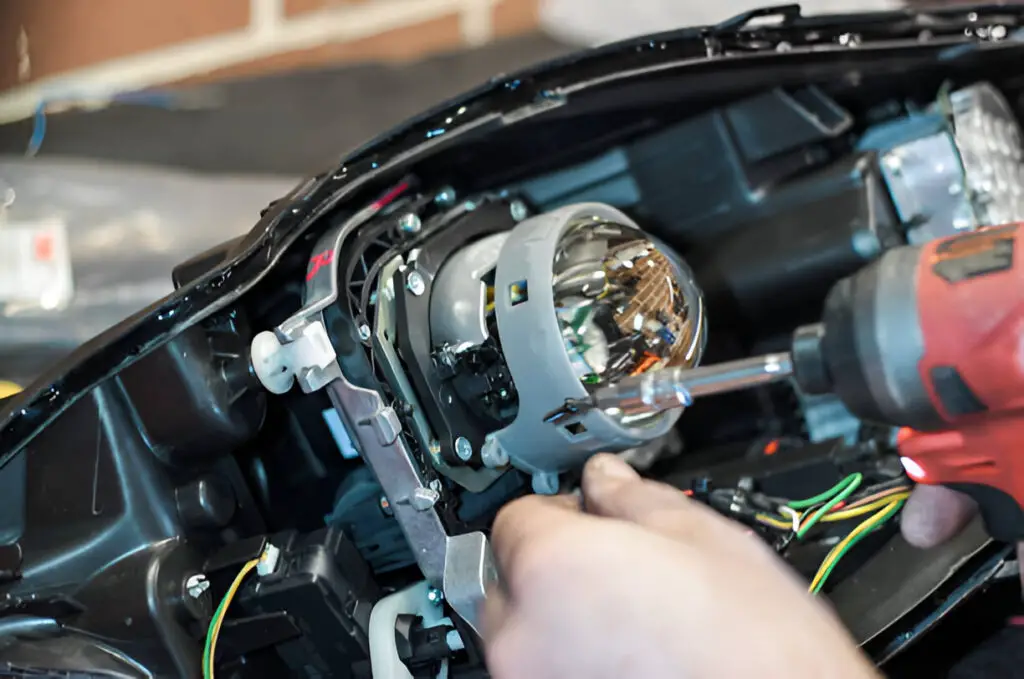If the headlight keeps going out but the bulb is still good, the issue may stem from faulty wiring, a loose or corroded connector, or a blown fuse. It could also be caused by a bad headlight switch or grounding problems.
It can be frustrating to have a headlight keep going out, especially when the bulb is still good. Your first instinct might be to replace the bulb, but what happens when the problem persists even after swapping it? This common issue could stem from a variety of causes beyond the bulb itself, ranging from wiring problems to faulty connectors or even a malfunctioning electrical system.
In this detailed blog post, we will explore the possible reasons why the headlight keeps going out and provide effective solutions to fix the problem.

Contents
Causes of Headlight Keeps Going Out But Bulb Good
If the headlight keeps going out but bulb is good, the issue likely stems from another part of the electrical system. Here’s a breakdown of possible causes and how to troubleshoot them:
1. Faulty Wiring
One of the most frequent culprits behind a headlight that keeps going out, even when the bulb is good, is faulty wiring. The wiring that connects the headlight to the power source can degrade over time due to wear, corrosion, or exposure to elements like moisture and dirt. Damaged or frayed wires can cause an intermittent connection, leading to flickering or complete headlight failure.
Signs of Faulty Wiring:
- Flickering headlights when driving over bumps.
- Intermittent operation where the headlight works sometimes but not consistently.
- Burning smell or visible damage to the wire insulation.
Solution: Inspect the headlight wiring harness for any signs of wear, corrosion, or damage. If the wiring looks damaged, you may need to replace the wiring harness or patch the broken wires. In some cases, it might be necessary to enlist the help of a professional for a thorough electrical system check.
2. Loose or Corroded Headlight Connector
Another common issue is a loose or corroded headlight connector. Over time, moisture or dirt can seep into the connector, leading to corrosion and a poor electrical connection. If the connector becomes loose or corroded, it can cause the headlight to lose power, even though the bulb is in perfect condition.
Signs of a Bad Connector:
- Visible corrosion or dirt buildup around the connector.
- The headlight flickers or turns off completely when you touch or move the connector.
- Only one headlight is affected, while the other works perfectly fine.
Solution: Check the headlight connector for any signs of corrosion, dirt, or loose connections. Clean the connector using a contact cleaner and make sure it is securely attached to the bulb. If the corrosion is severe, you may need to replace the connector altogether.
3. Blown Fuse or Faulty Relay
Every electrical system in the car, including the headlights, is protected by fuses and relays. If the fuse that controls the headlight circuit blows or the relay becomes faulty, it can prevent the headlight from receiving power. Fuses can blow due to electrical surges or short circuits, while relays can wear out over time or become stuck in the open or closed position.
Signs of a Blown Fuse or Faulty Relay:
- Both headlights fail to work at the same time.
- The headlights fail to turn on even after replacing the bulb.
- Other electrical components in the vehicle might also be affected (e.g., dashboard lights or interior lights).
Solution: Locate the car’s fuse box and check the fuse that controls the headlights. If the fuse is blown, replace it with a new one of the same amperage. Similarly, check the headlight relay for any signs of damage or malfunction. If the relay is faulty, it should be replaced with a new one.
4. Bad Headlight Switch
The headlight switch in the vehicle controls the power to the headlights. If the switch becomes faulty, it can cause the headlights to work intermittently or not at all. The switch can wear out over time or develop internal faults, causing an inconsistent electrical connection.
Signs of a Faulty Headlight Switch:
- The headlights do not turn on, or they work intermittently when toggling the switch.
- High beams work, but low beams do not, or vice versa.
- The switch feels loose or unresponsive when you try to turn the headlights on.
Solution: Replace the headlight switch, if it is faulty. This is a more advanced repair that may require some disassembly of the dashboard, so it’s best to consult a professional mechanic if you are not comfortable doing it yourself.
5. Grounding Issues
The headlights rely on a proper electrical ground to function correctly. If the grounding wire becomes loose, corroded, or disconnected, it can prevent the headlight from working, even though the bulb is still good. Grounding issues can also cause flickering or dimming headlights.
Signs of Grounding Problems:
- Both headlights flicker or fail to work intermittently.
- Dim headlights even when the bulbs are new.
- Visible corrosion or a loose grounding wire.
Solution: Inspect the grounding wire for the headlights and check for any signs of corrosion or loose connections. Clean the grounding point and ensure the wire is securely fastened. In some cases, you may need to replace the grounding wire if it is damaged.
6. Malfunctioning Headlight Module (For Advanced Systems)
Modern vehicles often have advanced lighting systems controlled by a headlight module. This module is responsible for managing functions like automatic headlights, adaptive lighting, and daytime running lights. If the module malfunctions, it can cause the headlights to go out, even if the bulbs are in good condition.
Signs of a Faulty Headlight Module:
- Headlights fail to turn on automatically or behave erratically.
- Both headlights go out at the same time.
- Other lighting functions, such as high beams or daytime running lights, may also be affected.
Solution: If you suspect a malfunctioning headlight module, you will likely need to visit a dealership or an experienced mechanic for a diagnostic check. The module may need to be reprogrammed or replaced depending on the issue.

Diagnosing Headlight Keeps Going Out Problem
When the headlight keeps going out despite the bulb being good, follow this step-by-step guide to diagnose and fix the problem:
- Check the Bulb: Start by ensuring that the headlight bulb itself is indeed good. Even if it looks fine, try swapping it with a known working bulb from the other headlight. If the problem persists, move to the next step.
- Inspect the Wiring and Connector: Look for any visible signs of damage, corrosion, or loose connections in the wiring and connector. Clean or replace components as needed.
- Test the Fuse and Relay: Check the headlight fuse in the fuse box. If it’s blown, replace it. Also, test the headlight relay to see if it’s functioning properly. Replace the relay if necessary.
- Examine the Headlight Switch: Toggle the headlight switch and see if the lights flicker or work intermittently. If the switch feels loose or doesn’t respond correctly, consider replacing it.
- Check Grounding Points: Verify that the headlight’s grounding wire is secure and free from corrosion. Clean the grounding point and ensure a tight connection.
- Consult a Mechanic: If none of the above solutions work, there may be a more complex issue, such as a faulty headlight module. A professional mechanic or dealership can run a diagnostic test to pinpoint the exact problem.
Frequently Asked Questions
Here are some FAQs about headlight issues –
1. Can a bad alternator cause headlight problems?
Yes, a malfunctioning alternator can lead to inconsistent electrical power, causing the headlights to flicker or go out. If you experience dim or flickering headlights along with other electrical issues, have the alternator checked.
2. Why do my headlights only work intermittently?
Intermittent headlight operation could be due to loose or corroded connections, faulty wiring, or a bad headlight switch. Inspect the headlight components and repair or replace any faulty parts.
3. Can a bad battery cause my headlights to stop working?
A weak or dying battery can cause headlights to dim or stop working altogether, as there may not be enough power to properly run the electrical system. If you notice dimming lights along with slow engine cranking, it might be time to replace the battery.
4. Should I replace both headlights at the same time?
Yes, it’s recommended to replace both headlights at the same time to ensure even light output and avoid having one bulb burn out shortly after the other.
Conclusion
When the headlight keeps going out despite the bulb being good, it’s important to look beyond the bulb itself and investigate other potential causes. From faulty wiring to a blown fuse or malfunctioning relay, several factors can contribute to the issue. By carefully inspecting the headlight components and addressing the root cause, you can ensure the headlights work properly and safely.